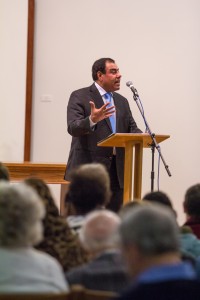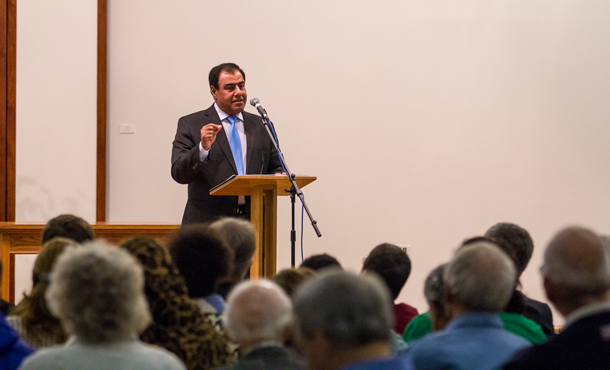In his book, I Shall Not Hate, Izzeldin Abuelaish traces his journey from an impoverished childhood in the Gaza Strip to medical school in Egypt and eventually, in face of enormous barriers, to become the first Palestinian doctor on the staff of an Israeli hospital. The book also describes his commitment to peacebuilding in Gaza, Israel and beyond – a commitment that was improbably deepened after three of his daughters and a niece died when his house was shelled by Israeli tanks in 2009.
During a two-day visit to Eastern Mennonite University in early November, Abuelaish shared what he described as a “message of hope and of justice” that views peacebuilding through a medical lens.
“The unit structure of our body is the cell. If one cell is sick, the whole body will react. My peace is linked to your peace. I am not in peace as long as others are not,” said Abuelaish during his Suter Science Seminar speech, arguing that seemingly distant violent conflict affects everyone in the world.
In a separate interview, Abuelaish also used medical language to prescribe a first step people can take to address conflict elsewhere in the world.
“We need to dig deeper to find out the root causes of the problem,” he said. “As in medicine, we take the history, we learn the history in order to reach accurate diagnosis. Accurate diagnosis is the light, is the truth, which helps us to set up the right treatment, and not to be stereotyped or deceived or misinformed anymore. That’s what is important, the first step.”
An obstetrician and gynecologist by training, Abuelaish is now an associate professor at the Dalla Lana School of Public Health at the University of Toronto. He also oversees the Daughters for Life Foundation, which was established in the memory of his three daughters to provide scholarships to women from the Middle East. Abuelaish is a vocal advocate for women’s education and empowerment to become “agents of change in our world.”
“I think it’s a powerful reminder that the things that seem most tragic in our lives, we have the choice to turn them into something positive,” said Daryl Byler, director of EMU’s Center for Justice and Peacebuilding (CJP). “He places a lot of hope in educating women so that they are prepared and able to be more a part of peacebuilding processes … and that’s something that we’re committed to here at CJP to nurturing.”
For several years, students supported by Daughters for Life have been studying at universities in Gaza, Israel and several other Middle Eastern countries, and in August, five women from the region began studying at the New College of Florida. During his visit to campus, Abuelaish expressed interest in a partnership that would send students from Daughters for Life to study at EMU, and met with President Loren Swartzendruber to discuss the possibility.
“Dr. Abuelaish’s story is compelling and one the world needs to hear,” said Swartzendruber. “Likewise, the dream of the Daughters for Life Foundation to educate girls and women from the Middle East is one that resonates with us at EMU. We will give serious consideration to developing a partnership with what is clearly a worthy cause, alongside the many other requests we receive from around the world.”
In addition to the Suter Science Seminar presentation, Abuelaish spoke at a seminary chapel, gave an evening community lecture, and attended a luncheon and conversation hosted by EMU’s Center for Interfaith Engagement.
“I lost my daughters but I didn’t lose hope,” he said. “I am here because of hope … [but] hope is not just a word … it needs someone to carry it, to believe in it, to move forward with it. Everything starts small. Start doing it. Others will follow you. Don’t wait for others. You need to start for yourself.”
